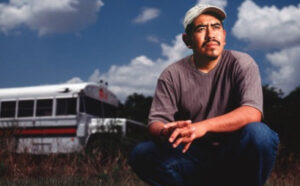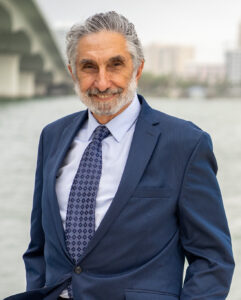To get the full picture, The Ruthless Truth interviews a farmworker leader and a Sarasota lawyer.
By WSLR News team
Original Air Date: May 17, 2024
Host: If you’re planning to enjoy a watermelon on this hot weekend, think for a moment about the cost that goes into it — specifically, the bus crash near Ocala this week that caused the death of eight farmworkers and injured 45 more. To get the full picture, Ruth Beltran, host of the Ruthless Truth show on WSLR, interviewed a farmworker leader and a lawyer. We provide a summary of those interviews here.
Johannes Werner: They were on their way to pick watermelons, but they never got to the field. Early Tuesday morning on a state highway near Ocala, a pickup truck sideswept the school-bus type shuttle that was driving farmworkers, most of them hailing from Mexico, to a farm. The bus crashed through a fence, hit two trees, and overturned.
Lucas Benitez is one of the founders of the Coalition of Immokalee Workers, a group that has organized mostly tomato pickers in Southwest Florida. He told Beltran on Wednesday that the deaths and injuries were avoidable.
Lucas Benitez: [in Spanish]

Lucas Benitez
Voiceover: This is, without doubt, a great tragedy. It’s a tragedy not only for the agricultural community, but for the community of workers in the state of Florida. This tragedy involves farmworkers, but the question is, who is next? It’s very deplorable this type of accident still happens. This bus left the road and overturned, in part because this type of bus often does not have the kind of safety that should be required to transport these workers, these human beings to their workplace. So, as of now we know it was not the bus driver’s fault. Even so, there was not enough safety in this bus to avoid this tragedy and the loss of eight workers. It hurts to think about how their families have yet to learn about this, that their loved ones cannot come home to their country and hug their children, their spouses, their parents. It’s very sad.
JW: Benitez said the Coalition of Immokalee Workers is working with the Mexican government, by way of the Mexican consulates in Orlando and Miami, to make sure the injured workers get all the medical attention they need, and to send home the bodies.
As of Friday morning, six of the eight dead had been identified. One of the dead workers hailed from the southern state of Oaxaca, but his wife has yet to learn about this, Benitez said on Wednesday.
LB: [in Spanish] Voiceover: At least one of the dead who has already been identified, is from Oaxaca. He left his wife there. She has not been notified yet, we’re on this. Sad.
JW: A recent state law blocks local heat ordinances to protect workers. Asked about this, Benitez said Coalition of Immokalee Workers have protections in place with participating companies. But he says that politicians who take this lightly are “silly”.
LB: [in Spanish] Voiceover: What happens to watermelon pickers, like those workers in Ocala? What happens to workers in construction, in landscaping, in other industries that have to work outside in the heat? The question is: How many lives have to be lost until the politicians realize they’re on the wrong road?
JW: Brent Probinsky is a Sarasota-based lawyer who has represented farmworkers and their families in injury and death cases. He has close ties to both the Mexican foreign ministry and the Coalition of Immokalee Workers and is involved in the Ocala cases. Probinsky points out that – ironically – the injured workers and the families of the dead were actually lucky — kind of.

Brent Probinsky
Brent Probinsky: We understand that most of the workers came from Oaxaca, which is a state in southern Mexico, and most of them came from one area of Oaxaca. I am there very frequently, because we assist those communities with a lot of different projects, including education. In this case, we understand that these workers are H2A workers. An H2A worker is a worker that comes up with a valid H2A visa, to work for a specific farmer for a limited period of time, usually about six months. And so they’re here on an H2A visa, which means that there will be coverage, insurance coverage, for this accident under the H2A contracts, which are really federal, under federal immigration law. They will be covered for these injuries under the H2A arrangement. And so the deaths, unfortunately, of those workers who died, their families will receive compensation as the process moves forward. I can’t say exactly how much at this present time, but each family will receive compensation even though they might be in Mexico. We often have families in Mexico of people who are deceased here. They will receive benefits. And the ones who are injured, who are in the hospital for treatment, their medical care will be paid for, however long that takes. So that’s all good news for them.
The Mexican consulate is in from Miami and has gone to Orlando, hosted by José Manuel Murillo from the Miami consulate. He’s the assistant consul. He has gone up to Orlando to assist with this now. They received a special call from the ambassador, from Mexico, to do this. And so all hands are on deck to help these families. I’ve been a lawyer for 24 years for the Mexican consulate in Miami. I’m what they call a consulting lawyer, and myself and others will be available to help these families. I’ve gotten a few calls from families already, and we are in touch with them and doing all the things we can to assure them we will be there to help them, and to give them information about their loved ones.
JW: We’ll give Lucas Benitez, the farmworker leader, the last word:
LB: [in Spanish] Voiceover: American society, particularly young people, should know that the fruit and veggies that are sold in supermarkets are not born there. Somebody had to pick them, and they appeared in that store thanks to the hands mostly of migrants. They make it possible that this food appears on our tables. These are human beings. They’re here sacrificing part of their lives to bring the daily bread to their families, but we do this work with so much pride and dignity because we know that we feed the world with our hands. Next time you go to the store, and you see a tomato, a watermelon – which is what these workers were going to pick – let’s take a moment to remember that this is work done by the hands of immigrants, of human beings.
Thank you to Ruth Beltran for sharing the interviews with WSLR News. To listen to the full interviews with Benitez and Probinsky, go to wslr.org, and look for the latest edition of The Ruthless Truth.
WSLR News aims to keep the local community informed with our 1/2 hour local news show, quarterly newspaper and social media feeds. The local news broadcast airs on Wednesdays and Fridays at 6pm.